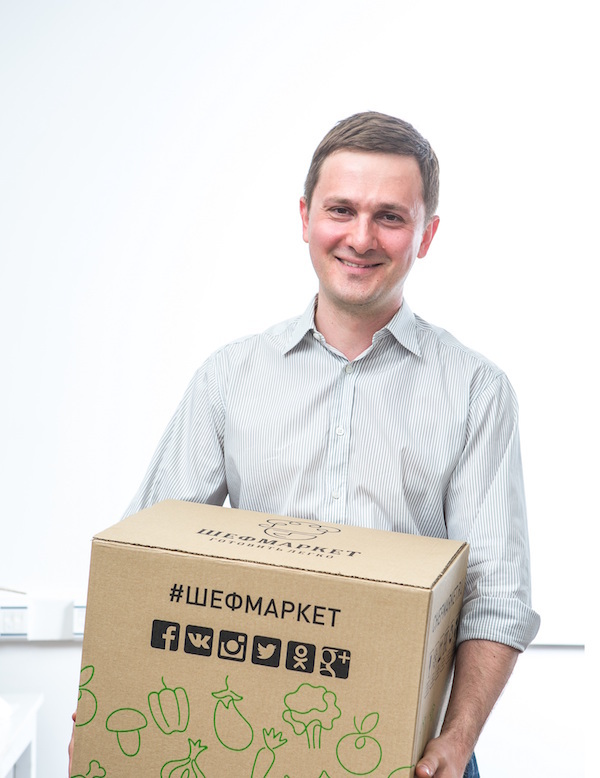Founder's advice. Sergey Ashin, Shefmarket

“Founder Councils” once again acquaint Megamind’s readers with IT market stars, founders and managers of their own business.
Sergey was born in Nizhny Novgorod in 1978, education: MBA of the London Business School.
For more than 10 years he worked in metallurgy, managing the European assets of OAO TMK, as a consultant, McKinsey & Co worked to improve the operational efficiency of enterprises, including the implementation of a continuous improvement system.
')
In 2012, Sergey created the Shefmarket project - home delivery of recipe sets, the client only chooses a delivery subscription (dinner, diet or vitamin cocktails) from a large set of 400 dishes, and the delivery works in Moscow, St. Petersburg and Nizhny Novgorod.
Today, Chefmarket delivers more than 6,000 orders per month, showing a threefold increase from year to year. The company's revenue is more than 20 million rubles a month.
Here are some tips Sergey Ashin shared with the audience of Megamind.
1. Solve real problems
The best ideas for a startup grow out of the problems that people encounter daily. The easiest way is to start in an area where you already have good practical experience, but do not be afraid of areas you are not very familiar with.
If you have an idea of which you are on fire, take it up regardless of your experience and connections: often the professional's opinion is limited by established practices, and this allows startups to successfully implement breakthrough ideas in fully mature and unfamiliar markets. The most important thing for you is to solve a real-life problem.
2. Find your customer and adapt the product for him.
Adapting a product is a continuation of the idea of a quick launch. Do not expect on the first day of the sale of crowds of customers who are eager to buy your product. Concentrate on quickly refining the product based on feedback and comments from its first users. Create the perfect solution for existing customers: it will pay off customer loyalty and customer base growth. So you quickly check the viability of the idea and get a lot of knowledge for its further development, including for the wider market.
3. Start fast
Many ideas die just when the business plan has already been drawn up, and the work has not yet begun. A quick start is not even important in order to quickly issue a product, but in order not to burn out before the real work begins. The moment of launch will give invaluable experience and feedback, so do not immediately try to build something extremely complex and ideally working. Set yourself the task to achieve the minimum sufficient result to test the viability of the idea in real market conditions. However, it is very important to determine this minimum correctly: if the bar turns out to be too low, you can simply not see the potential of business development, and if it is too high, you can’t reach it (for financial or other reasons) before it is revealed even at the first stage of activity.
4. Focus on service
Product-oriented startups often do not use the most powerful lever called “service” in full force. Create not just good service - make it perfect. This is very important also because at the first stage you cannot do without annoying punctures on the quality of the product, and the service will be your savior in the struggle for customer loyalty. Go beyond the usual business style, contact with customers personally and they will help improve your product.
5. Look for employees with burning eyes.
At some point, the forces of the project founders will cease to be enough and you will begin to hire people from outside. At the first stage in a startup, it’s not so much the experience of the employees hired, but their enthusiasm. Try even before accepting a candidate for a job to find out how sincere he is and whether he is able to cope with significant workloads, because investing time in training hired employees is comparable to the cost of their salary. And in a situation where it was not possible to work together, it is important not to drag out time and quickly leave: in the absence of intrinsic motivation, a person not only performs his duties worse, he also destroys the entrepreneurial spirit of the team.From the above, perhaps the biggest role in the success of our team was the ability to quickly identify the target audience and offer the right product to it. If with your product you get to the point, the chances of winning significantly increase - but, unfortunately, not up to 100% or even not up to 50%. The success of a startup depends on the balanced development of all essential components of the project at the right pace and with available funds. Creating a startup is a unique experience and drive, to gain and experience that I wish everyone.
Editorial note: if you have a desire to participate in the “Founder’s Tips” section, write to us at editor (at) megamozg.ru
Source: https://habr.com/ru/post/298164/
All Articles